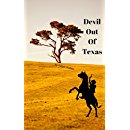Devil Out of Texas by Roger Raffee, 2016; Amazon Publications; 456 pages; now on Kindle.
By Donald H. Harrison

 SAN DIEGO – Author Roger Raffee, a fellow San Diegan, has written a novel—and I’ll repeat that word “novel”—purportedly about a great-great grandfather who was a sure-shooting, fast-drawing Texas Ranger who could snuff out a man’s life in less than a heartbeat but who also had a social conscience. Although based in San Antonio, Ranger Aaron Raffee spent a good deal of his time across the long Mexican border, either chasing banditos or helping them, depending on whether they seemed to be on the side of justice or against it. He sought tikkun olam—the repair of the world – with a six shooter.
SAN DIEGO – Author Roger Raffee, a fellow San Diegan, has written a novel—and I’ll repeat that word “novel”—purportedly about a great-great grandfather who was a sure-shooting, fast-drawing Texas Ranger who could snuff out a man’s life in less than a heartbeat but who also had a social conscience. Although based in San Antonio, Ranger Aaron Raffee spent a good deal of his time across the long Mexican border, either chasing banditos or helping them, depending on whether they seemed to be on the side of justice or against it. He sought tikkun olam—the repair of the world – with a six shooter.
The kind of yarns that were told about Aaron Raffee might reasonably be expected to be heard around a campfire, to the accompaniment of sizzling bacon (yes, bacon), boiling coffee, and snapping twigs. You could believe them or not, so long as the stories were suspenseful. In addition to the fact that Aaron could fatally shoot five banditos before any of them could get their guns all the way out of their holsters, there was little else that was remarkable about this Jewish lawman – except perhaps for his humility in a time and era characterized by braggadocio. Whether working as a Ranger, or as a San Antonio policeman, Aaron generally was happy with his lot—the only real tension in his life coming from his wife’s incessant demands that he find some line of work which would pay him more money so they could afford some of the finer things in life.
The great-great grandson rolls out a chronicle of Aaron’s exploits with the speed of a Gatling gun, one burst right after the other, so you get the feeling that wherever Ranger Aaron went adventure was lying in ambush for him. He had a long list of adversaries whom he put into early graves, and an equally long list of friends (not all of them necessarily upstanding citizens) upon whom he conferred both loyalty and protection. You couldn’t look at a man and know to which group Aaron would assign him; Aaron had no particular prejudices for or against Mexicans, Indians, Southerners, Northerners, military, civilians ranchers, farmers, railroaders, Christians or Jews; rather he seemed to gravitate toward the little guy, favoring the Davids who stood up to the Goliaths.
Living today at a time when many states, including California, are considering abolishing the death penalty, one wonders at the apparent ease—and lack of regret—with which Aaron could shoot the life out of some miscreant. At the same time, one could be mystified by Aaron’s refusal to kill a fleeing bank robber, who turned in his saddle more than once to fire his gun at Aaron. According to Aaron’s later account, he could tell by the way the inexperienced robber was holding the gun that he couldn’t hit him. Besides, Aaron just didn’t feel like killing anyone else on that particular day. Clearly, this lawman had his own standards, not so easily categorized.
As literature, Devil Out of Texas, has a host of problems. It is overly long, there is very little character development, the dialogue often doesn’t ring true. Although the book makes a point of Aaron’s Jewishness, this issue is not explored very deeply. However, as a source of stories about the old West, Devil Out of Texas satisfies our innate desires to be amazed, to admire, and to imagine.
I personally hope that Roger Raffee will continue to refine this story; that the book will metamorphose into a series of short stories each with moral messages for readers to ponder.
*
Harrison is editor of San Diego Jewish World. He may be contacted via donald.harrison@sdjewishworld.com .